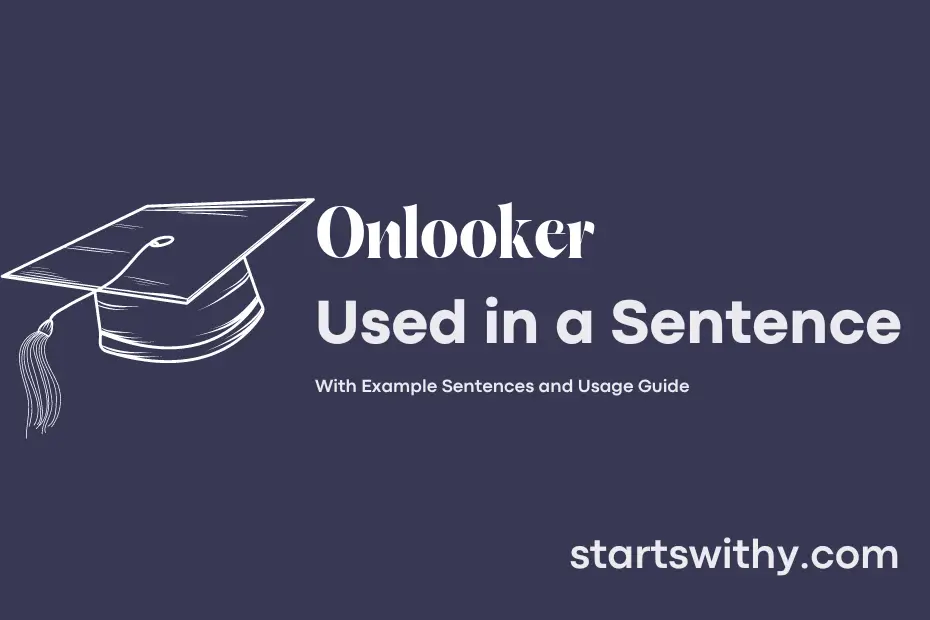Do you know what an “onlooker” is? An onlooker is someone who observes a situation without actively participating in it, often standing by as events unfold before them.
In a variety of scenarios, an onlooker can be seen watching, assessing, or simply observing without getting involved. Let’s explore how this term can be utilized in different contexts.
7 Examples Of Onlooker Used In a Sentence For Kids
- The onlooker watched the birds flying in the sky.
- The onlooker clapped loudly when the dancers performed.
- The onlooker smiled at the cute puppy playing in the park.
- The onlooker waved back at the children playing near the school.
- The onlooker cheered for the runners in the race.
- The onlooker laughed at the funny clown at the circus.
- The onlooker gasped when the magician made the rabbit disappear.
14 Sentences with Onlooker Examples
- Onlookers gathered around to watch the heated debate during the political science class.
- The onlooker observed the chaos that ensued after the surprise quiz was announced.
- During the dance competition, excited onlookers cheered loudly for their friends on stage.
- The onlooker couldn’t help but chuckle at the funny antics of the theatre group rehearsing for their play.
- As the chemistry experiment went awry, concerned onlookers watched nervously from a safe distance.
- The fashion show drew a crowd of onlookers eager to see the latest trends and designs.
- The onlooker felt a surge of pride as their classmate delivered a powerful speech at the debate competition.
- During the cricket match, enthusiastic onlookers waved flags and banners in support of their team.
- The group project presentation captivated onlookers with its innovative ideas and creative approach.
- Onlookers gasped in amazement as the magician performed a mind-blowing illusion on stage.
- The campus protest attracted a large crowd of onlookers who were curious about the cause being advocated for.
- The onlooker marveled at the intricate artwork displayed at the college art exhibition.
- The academic conference drew a diverse audience of onlookers interested in the various research topics being presented.
- During the music concert, onlookers swayed and sang along to the catchy tunes being performed on stage.
How To Use Onlooker in Sentences?
To use Onlooker in a sentence, start by identifying a situation in which there is someone observing a scene or event. The Onlooker is typically a person who is watching or observing something without actively participating in it.
For example, you could say, “The Onlooker watched in awe as the magician performed his tricks on stage.” In this sentence, the word Onlooker is used to describe someone who is simply observing the magician’s performance without being directly involved.
Another example could be, “The Onlookers gathered around to see what was happening, but none of them intervened.” In this sentence, Onlookers refers to a group of people who are watching a situation unfold without getting directly involved.
It’s important to remember that Onlooker is a noun and should be used as such in a sentence. You can also use adjectives to describe the Onlooker, such as curious Onlooker or concerned Onlooker.
In summary, when using Onlooker in a sentence, make sure to properly identify a person or group of people who are observing a situation without actively participating. By using this word correctly, you can effectively describe the presence of spectators or bystanders in a given scenario.
Conclusion
In conclusion, a variety of sentences containing the keyword “onlooker” have been demonstrated, showcasing the diverse ways in which this word can be used. From describing a curious bystander observing a scene to depicting a scene from the perspective of an onlooker, these examples illustrate the flexibility and richness of language. “Onlooker” effectively conveys the idea of someone observing a situation from the sidelines, adding depth and context to descriptions and narratives.
By incorporating the word “onlooker” into our writing, we can vividly paint a picture of a scene or event, allowing readers to imagine themselves in the role of the observer. This word adds a layer of characterization and emotion to our storytelling, enhancing the overall impact and engagement of our writing. The examples provided serve as a reminder of the power of carefully chosen words in creating compelling and descriptive sentences.



